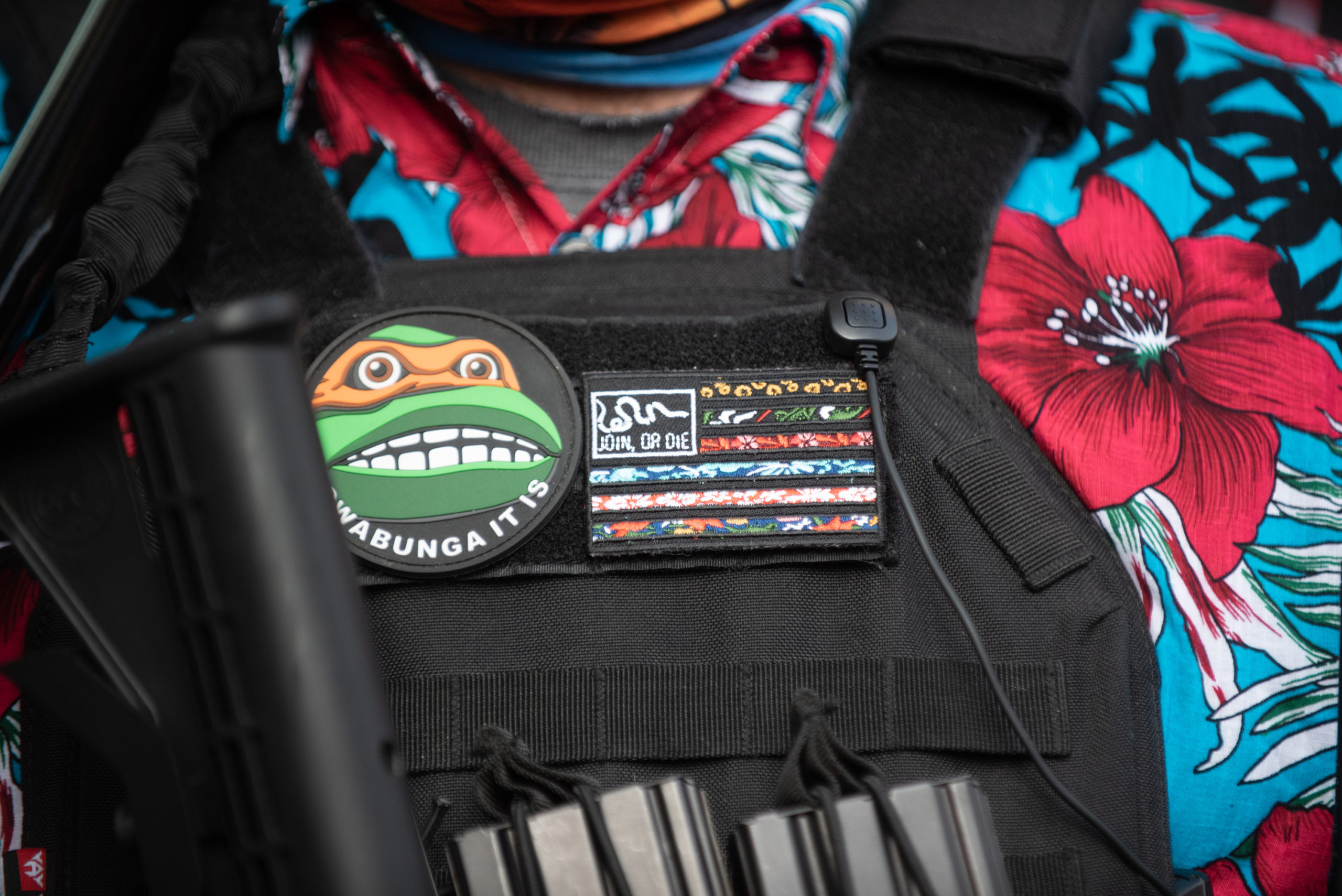Federal lobbying disclosures reveal that Palmetto State Armory, a burgeoning South Carolina firearms manufacturer with a record of using rhetoric and imagery popular in anti-government circles, retained Washington, D.C., lobbyist Craig Metz of the firm Nelson Mullins Riley & Scarborough last December. The move came only months after the company began selling products emblazoned with imagery associated with the “boogaloo” — which is slang for a war to topple the federal government, something adherents prepare for, and in some cases seek to accelerate.
Palmetto State Armory was one of three dozen dealers of firearms, ammunition, and tactical supplies that an investigation by The Trace identified as using boogaloo-related rhetoric and imagery in their marketing and products. In February 2020, Palmetto produced and sold a limited edition AK-47-style pistol with a custom, “Big Igloo Aloha” Hawaiian-print paint job. The cheery floral pattern of the Hawaiian shirt is the unofficial uniform of pro-boogaloo accelerationists, and it frequently adorns irony-laden memes shared by supporters online. A month later, the company began offering T-shirts featuring a cartoon caricature of an armed, Hawaiian shirt-clad man guarding a pile of toilet paper rolls. The shirts are still available on its website, though the pistol is not.
Extremists with boogaloo ties participated in the deadly January 6 Capitol insurrection, as well as in multiple acts of political violence over the past year. “Boogaloo boys,” as they call themselves, were charged in the attempted kidnapping of Michigan Governor Gretchen Whitmer in October, 2020, as well as in multiple acts of domestic terrorism designed to sow chaos around last summer’s racial justice protests. Following the insurrection in Washington, D.C., the FBI warned of the potential for more boogaloo-related violence across the country.
Metz, the lobbyist, declined an interview request by email, and said that Nelson Mullins policy forbids him from discussing work for clients with the media. He did not respond to a specific request for comment on Palmetto State Armory’s use of anti-government imagery. It is unclear whether Metz or his associates at Nelson Mullins were already aware of the company’s tacit support of the extremist movement.
Jason Blazakis, the former director of the Counterterrorism, Finance, and Designations Office at the Department of State, who is now director of the Center on Terrorism, Extremism, and Coutnerterrorism at the Middlebury Institute said, “There’s a reputational risk for these companies.
“We’re in a society where we can’t look the other way where these kinds of things transpire, because it just emboldens individuals to continue down these really dangerous pathways,” he added. Blazakis also noted that, because of the lobbying, lawmakers may effectively “be providing some level of support to a company who is engaging in anti-government behavior.”
The lobbying disclosures, filed in December 2020 and January 2021, state that Metz was paid $10,000 in the final quarter of 2020 to lobby the U.S. Senate regarding the Bureau of Alcohol, Tobacco, Firearms and Explosives’ classifications of firearm accessories. Palmetto State Armory’s owners did not respond to requests for comment.
Palmetto State Armory, founded in 2008, has a long history of using controversial rhetoric. In 2011, the company was criticized for selling a limited run of AR-15 lower receivers — the crucial part of a gun that is considered a firearm under federal law — inscribed with “You Lie,” the words shouted by U.S. Representative Joe Wilson of South Carolina at President Barack Obama during a 2009 congressional address. The company stopped selling the gun part several months later, following the shooting of U.S. Representative Gabby Giffords of Arizona and 18 others at a constituent meeting. Wilson thanked the company for halting sales, not disclosing that his son, Julian Wilson, is a co-owner of Palmetto State Armory and an executive at its parent company, JJE Capital.
In ensuing years, the company has continued to produce lower receivers inscribed with imagery and language associated with far-right memes, selling them on a section of their site called “meme lowers.” In December 2019, one month before the pro-gun Lobby Day protest that led to a declaration of a state of emergency in Virginia over fears of extremist violence, the company created and sold a “Virginia-15” lower. The design featured a reimagining of the Virginia state flag in which the Roman goddess Virtus holds a rifle and is wearing night-vision goggles — an accessory common in boogaloo memes circulating around the same time. According to an Instagram post, proceeds went to the Virginia Citizens Defense League, which organized the demonstration. The Virginia lowers recently reappeared on Palmetto State Armory’s website, and are currently available for sale.
Other clients represented by Metz include Comcast and the South Carolina branch of Blue Cross Blue Shield. In the wake of the January 6 insurrection, both companies halted political donations to members of Congress who refused to certify the 2020 presidential election results. Neither company responded to requests for comment and the contracts with Nelson Mullins make up a small fraction of their overall lobbying spending.
Recently, Palmetto State Armory has been expanding its business. The company announced plans to open a seventh retail location with an attached firing range in the former headquarters of the local South Carolina newspaper, The Sun News of Myrtle Beach. When one of the oldest and largest firearms manufacturers in the country, Remington, filed for bankruptcy last year, Palmetto State Armory’s parent company made a $65 million stalking-horse bid for its assets. Ultimately, it acquired five of Remington’s brands for $2.15 million, according to a Bloomberg Law report. The sale should help Palmetto State Armory increase its already ballooning manufacturing. According to the latest available ATF statistics, Palmetto State Armory increased its production by roughly 40 percent in 2019, so it reached 45,000 firearms and 275,000 “Miscellaneous firearms,” a class of accessories and parts, including lower receivers.

